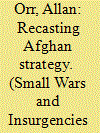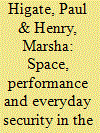| Srl | Item |
| 1 |
ID:
091491


|
|
|
|
|
| Publication |
2009.
|
| Summary/Abstract |
The following article aims to examine current counter-insurgency (COIN) strategy in Afghanistan to posit an untried theoretical concept of operations for the war being waged there. By doing so it shall argue that Coalition and NATO forces operating there may be required to fundamentally recast Afghan war-policy if a resurgent Taliban and Al-Qa'eda are to be countered in both the military and political spheres of present day Afghanistan. By way of strategy this article shall posit that a more optimal strategy in Afghanistan, in light of the campaign's apparent difficulties, might be to seed local security apparatuses, designated herein as 'Rural Paramilitary Forces'.
|
|
|
|
|
|
|
|
|
|
|
|
|
|
|
|
| 2 |
ID:
093882


|
|
|
|
|
| Publication |
2010.
|
| Summary/Abstract |
Studies of peacekeeping have helped to reveal the complexities, dilemmas and challenges of operations since their inception, and almost certainly into the future. Yet, despite the empirical and theoretical breadth of this canon, the field continues to be dominated by political science, development studies, international law and military studies, whose scholars tend to draw on 'problem-solving', macro-level and positivist perspectives in their writings. The impact of post-structural and post-positivist epistemologies developed in sociology, human geography and cultural studies remain marginal in the field. Given this, the present article seeks to complement and develop the study of peacekeeping through its framing of blue-helmet activity as embodied, spatial-security practice that is performed 'out front' for the 'beneficiary' audience. In so doing we draw on critical geopolitics, military/human geography and sociological theorizing with a focus on space and performance. Our main aim is to show how the concepts of space and performance can be used to illuminate perceptions of everyday security by recourse to a modest, illustrative empirical component based on fieldwork in Haiti, Kosovo and Liberia.
|
|
|
|
|
|
|
|
|
|
|
|
|
|
|
|